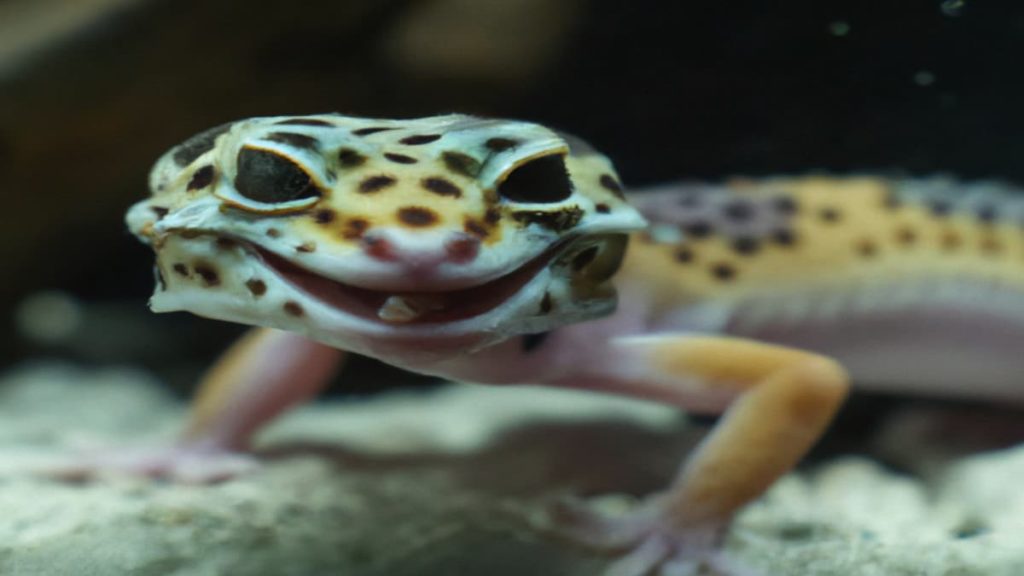
I didn’t really want to write this article about leopard gecko diseases and illnesses. Because it’s kind of depressing to think about. But being aware of these symptoms and possible diseases could help save gecko lives so it’s important to know this stuff.
Before we get into the ‘heavy’ stuff, it is useful to know that leopard geckos are one of the healthiest reptiles. Since they live for up to 20 years they are one of the easiest lizards to own. I haven’t ever had to deal with a leopard gecko that had a serious health problem.
SUPER IMPORTANT: I wrote this article to help fellow gecko owners be more aware of things to look out for. But please, if you are ever unsure, always talk to a qualified vet. You can now get vet advice online – so it’s super quick to get help.
You Leopard Gecko Could Be Having Health Problems If:
- Not very alert when you are holding them. Almost like they are in a daze and not paying attention to anything around them.
- Their tail is losing thickness. If the leopard geckos tail is getting very thin they could be getting sick or have a disease or illness. If you have leopard geckos housed together and notice that one of them has dropped their tail the other gecko is probably bullying the other one (see this on leopard gecko tails).
- You notice that you can see the bones in their body. Gecko bodies should have some thickness to them – bones should not be easily visible.
- They have any bumps or bulges in their stomach. Make sure they are not pregnant if you do notice a bulge.
- Their skin is discolored. If their skin looks discolored (and they are not shedding), or they have blisters or open cuts that is a strong sign that something is wrong with them.
- Their eyes are not clear. Make sure there is nothing draining out of their eyes and there is no swelling.
- Drooling or pus coming from their mouth. There shouldn’t be anything draining out of their mouth. Their jaw bone should be firm. Their mouth shouldn’t be gaping or anything. This is a symptom of MBD (metabolic bone disease).
- They are missing toes. There shouldn’t be any extra skin around them (see shedding problems). If their toes are swelling or bleeding this could be a sign of infection.
- Their feces are liquid or off-color. They should be solid (black, brown, and a little white). Their feces shouldn’t be diarrhea or different colors.

Leopard Gecko Health Problems & Illnesses
Some of these photos can be a little bit upsetting, so I’ve kept them small. But it’s important to have an idea of what to look for so you know when your gecko is healthy or ill.
Impaction
The number one problem I have seen over the years is impaction. The results of impaction can often be fatal if left untreated.
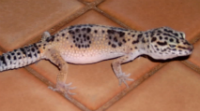
This happens when leopard geckos eat their substrate. Gecko stomachs have a hard time digesting sand, and I really believe calcium sand should be avoided. Also, your leopard gecko can get impacted by eating food that is too big.
Prolapse
This is a serious health problem. Basically, an organ is trapped outside of their body. Typically, you will notice a vent under their tail which looks like there is something sticking out of it.

Make sure you take them to the vet immediately if you see this. This can be fatal if not treated right away.
Skin Infections
Leopard geckos can face a variety of skin problems, including Dysecdysis (shedding problems), Bacterial Dermatitis (skin infection), Tail Necrosis (tail rot), and Ulcerative Stomatitis (mouth rot). These conditions can be caused by improper husbandry, unbalanced diet, and lack of hygiene in their habitat. Read more about leopard gecko skin infections.
Egg Binding
This is also called dystocia. This happens when leopard geckos have problems laying eggs. Their eggs are not leaving their body when it’s time to lay eggs.

A lot of times this happens because they are not getting enough calcium in their diet. You may notice your leopard gecko straining to lay eggs, is acting depressed, is not eating very much, or is very restless. This can be fatal so seek help as soon as you notice it.
Metabolic Bone Disease (MBD)
You will notice that your leopard gecko is having problems walking. Their limbs will appear ‘rubbery’. It might even appear that their limbs are completely broken. This is really one of the hardest diseases to witness as a gecko owner.
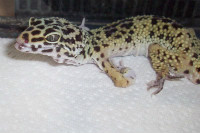
This happens because leopard geckos are not getting enough calcium in their diet or there is an imbalance between calcium and phosphorous. Leos require a diet rich in calcium for strong bones. Make sure you are dusting their food with calcium and vitamin D3 supplements (as vitamin D3 aids in calcium absorption) to prevent this. There is no cure or reversing MBD once they have it – all that can be done is stopping it progressing any further. So the best action is prevention by getting their diet right.
Read more about leopard gecko metabolic bone disease.
Parasites
A parasite is a organism that is living inside of your leopard geckos body. They can have parasites for months before you really start to notice your gecko looking sick.
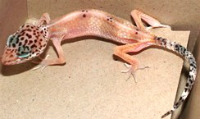
This is a pretty common gecko health problem. These parasites are breeding, feeding, and growing inside of your gecko. I know it sounds disgusting. They can cause bleeding from your geckos anus or you might see blood in their stools.
You can determine if your gecko definitely has a parasite by taking a feces sample to the vet. The vet will treat parasites by giving you a medicine that you need to feed to your gecko orally.
Read more about leopard gecko parasites.
Mouth Rot (Stomatitis)
Mouth rot, also known as stomatitis, is a bacterial infection that can be fatal if left untreated. It often occurs when leopard geckos are stressed, leading to a weakened immune system that allows bacteria in the mouth to grow rapidly.
Other causes include incorrect temperature or humidity levels, poor nutrition and hygiene. Regular cleaning of your leopard gecko’s tank and maintaining proper temperature can help prevent this disease. If your gecko shows signs of mouth rot, such as refusing to eat or drink, consult a vet as soon as you can.
Burns
Your leopard gecko can get burnt on a heated rocked, pad or even light. This can be a serious problem and can even be fatal with a bad burn.
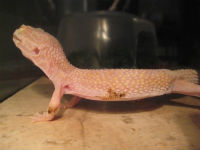
You can take your leopard gecko to a vet and they can put some topical ointment on them or give them some antibiotics. But again, prevention is the best cure here by careful habitat setup.
Respiratory Infections
Respiratory infections in leopard geckos are typically caused by bacteria when the humidity is high and the temperature is low in their habitat.
The symptoms include heavy breathing, bubbles on their nose, unusual laziness, weight loss, and wheezing. Maintaining proper temperature and humidity levels in their tanks can help prevent respiratory infections.
Tail Rot
Tail rot is a condition where the tip of a leopard gecko’s tail starts appearing dry, skinnier, and black compared to the rest of the tail. This can occur due to stuck skin shedding on the tail, which restricts blood flow and causes the skin to die off.
Another cause could be wounds from fights with cage mates. If you notice signs of tail rot, consult a vet immediately. If the tail tip has already started to die off, it may need to be removed to prevent the necrosis (rot) from spreading.
In Conclusion
Hopefully you never have to deal with any of these problems with your leopard gecko. But common illnesses and health problems are worth being aware of.
Important
It’s always best to take your gecko to a vet if you notice any symptoms or anything that is unexpected or different to what you are used to. You might not notice the warning signs for quite some time because reptiles do a really good job at masking their illnesses, so don’t delay when you do notice symptoms appear.
You can also chat to a vet online now. So if you’re at all concerned, think of your gecko first and get that professional advice.

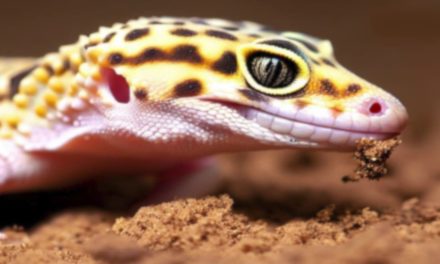

![Leopard Gecko Skin Infections [How To Spot Them & What To Do]](https://cdn.leopardgeckoland.com/wp-content/uploads/2023/06/sick-leopard-gecko-440x264.webp)











My gecko had a little pus come out of her rectal area and inside seemed to be red. She eats regularly, moves around fine, hasn’t lost any weight. I have been trying to research what it could be, but I have not found an answer.
How do I find a vet for my gecko?
Look at the vets close by but contact them first to see if they have experience with reptiles. You don’t really want to take your leo to a vet that’s never seen a leopard gecko before!
Or you can get vet advice online here. This can be good for some questions or concerns – and can be a lot cheaper. Sometimes you just have to take them to a vet in person though.
I’m getting a gecko soon and I was worried that it might get a disease. But after reading this article I now know there are ways to fix them. Thank you so much for the article!
My leopard gecko seems to be a little dazed and zoned out when I take him out. He eats, sheds normally, is active at night, poop is normal, isn’t prolapsed. Is he okay?
Yes he is probably fine. As long as he is showing all of the signs of a healthy gecko otherwise. He is probably just tame and comfortable with you 🙂
If I had two leopard geckos and one got sick and passed away (they were kept seperate and the other looks healthy still), is it OK to use the deceased ones cage as long as I clean it before putting my other gecko in it? I don’t know how contagious and hard it is to kill parasites and illnesses in the cage. I also removed all of her stuff from in the cage and scrubbed it.
Thank you
Thank you so much for your article. I wish I had had time to research all of these sooner.
We just lost one of our geckos. He got attacked by another one who had been housing with it for almost a year now. Although they had gotten along very well until now, we had planned on separating them because they were male, but the behaviour change happened too quickly.
I had not witnessed violence from them, so it was extremely shocking to wake up the other day and find one of them dead. The tail of the dead one was missing. It seems the attacker ate it. It all happened overnight. This was very heartbreaking.
The mistake is mine for not housing them separately from the start. 🙁
Does anyone know if the gecko who ate the tail might get sick from it? Can disease be transmitted that way, from one gecko eating another? Also, how long can a gecko live after it develops a bone disease?
My baby leopard gecko has a small injury on his head, it has become hard and somewhat crusty, and his skin appears to be shedding but it isn’t peeling off like it should. I am extremely concerned.
See if you can take him to a reptile expert. Unsure about the head injury but I think having a humid hide for him should help with the stuck shed, and if you already have one it may not be humid enough. Make sure not to leave crickets alone in his cage with him because they bite, and remove anything that he could fall off of and injure himself with.
I hope this helped and your gecko gets well soon.
Hi, I have a leopard gecko that is about 13 years old. I believe he has a parasite (shedding problems and losing fatness in his tail). I am going to take him to the vet, and I am glad I read this because they did not inform me about taking a stool sample.
My leopard gecko is female, about 13 years old and about the size of my hand. She had a lump on her lower belly for constipation about 4 years ago and healed great. About 2 months ago, she had a hole right in front of her right rear leg. It had just got done healing completely. Last night, she ripped it open and I don’t know why or how to move forward. It’s the largest she’s tore it open and it’s almost the size of a dime now. I cleaned her wound and shes in a sanitary cage at the moment. I used lidocaine wash to help the pain before washing out the sand. She’s moving around fine but she’s also not happy she’s in her travel cage. I have photos that I can send you. Please, any ideas or suggestions would be great. Thank you ahead of time. I just don’t want her to suffer.
My leopard gecko has a swollen bump on his right front leg – any idea what that problem can be?
Seeing that your leopard gecko has an unidentified bump, regardless of where it is located on the body, it is perfectly normal to have concerns. It is important to feel out whether or not the bump is free moving (able to be moved around in the skin) or rigidly stuck in position. In most cases of lumps in lizards near the front arm areas, the lump is actually filled with lymph fluid and calcium. Having these bumps is completely normal for your gecko and simply means that there is a reason behind why he or she is not metabolizing, or cycling through, the calcium right away. That being said, you should always bring your pet in for veterinary care if you suspect something isn’t quite right. Your VMD should also be seen for the routine care visits such as annuals and semi annuals as well for maximum pet welfare.
My leopard gecko has something black on one of his testicles and they seem swollen. Is this impaction or something else? I have soaked him a couple times but nothing coming out.
My son’s Leopard Gecko’s tail which until a week ago was fat and healthy, has shrunk down some. He is still eating, but he’s not acting his usual curious outgoing self. This morning I found an inch and a half long, 1/2 inch diameter white sack(?) thing where he poops, he’s shedding currently and refusing food today. He last ate 4 crickets two days ago. Any ideas as to what the sacklike thing is and do I need to find a reptile vet for this? Thanks from my son, Indy (the gecko), and me.
Mike
Don’t panic too much just yet – I think there’s a good chance this could be an unfertilized egg! Your ‘he’ may actually be a she. Have a look at this video on determining the gender. It should be pretty easy to tell (I’m guessing your leo is probably 9+ months old).
My gecko has a little gooey spot of clearish stuff in her eye and it’s been there for a while and I don’t want to remove it because I don’t know what it is. If you guys have an opinion of what to do that would help.
So my sons pet geck looks just like the one in the picture you described about parasites. Sadly today he is going to the vet to end his suffering. But this arrival of info was helpful to the vet. So he almost cured him. Thank you soooooooo much!
I’ve noticed my leopard gecko is developing darkish brown spots all over his body. I’m very concerned because it doesn’t look much like his pattern changing, rather than some type of disease forming..
It sounds like your leopard gecko might have a skin infection. I would recommend keeping your gecko in paper towel substrate. Give him a 20 min soak in 85-degree water for a week.
If that doesn’t help you can always take him to a vet.
Thanks for letting us know about leopard gecko diseases. I hadn’t really given any thought to this subject as our pet gecko Mordecai is still young.
This may be a silly question but can you tell me how do we know if Mordecai is a boy or girl? We weren’t told when we got him at the pet store. I guess if it turns our that our gecko is a boy then I wouldn’t have to worry about egg binding.
Also how likely is our gecko to get a parasite? He is in the tank most of the time and only comes out when my son plays with him.
This should help in determining the gender of your leopard gecko. Parasites are not very common with leopard geckos. Just make sure you’re cleaning their cage every 2 weeks and feeding them correctly.
It is a very sad thing to think of your leopard Gecko having a desease. They, just like cats and dogs, become a part of the family; especially if you bring them out of their habitat and handle them frequently during the day. We handled ours often and even took them to the library, Walmart and other outing during good weather.
We were lucky. we had our two for a long time and never had an instance or need to take them to the vet, which was a good thing because we live in a small town that doesn’t have a vet knowledgeable about reptiles.
This is a great article. I really didn’t know the different signs of problems that could occur so this post will be helpful for those who currently have leopard geckos.
Hehe, I take mine to the mailbox with me and watch movies with them 🙂
Cool post. You actually are an expert on geckos.
I have a question on MBD. If they have it and their limbs and they are rubbery or have trouble walking is there a way to reverse it?
Actually, there is no way to reverse it which is very sad. Typically, it will start in their front legs and they will walk on the back of their hands. This is because their arm and hands are fused together. If you start supplementing their diet correctly with calcium the disease will no longer progress.
Hope this helps.
I once had a leopard gecko that was a huge bully she would terrorize other geckos. I had to house her alone because one of my leopard geckos lost their tail and I suspected bullying. I wish I would have saw this sooner 🙁
Yep, it’s rare but some females I believe were incubated at a higher temperature so they might have a temper and need to be housed alone.